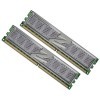- Qualcomm Launches Snapdragon 4 Gen 2 Mobile Platform
- AMD Launches Ryzen PRO 7000 Series Mobile & Desktop Platform
- Intel Launches Sleek Single-Slot Arc Pro A60 Workstation Graphics Card
- NVIDIA Announces Latest Ada Lovelace Additions: GeForce RTX 4060 Ti & RTX 4060
- Maxon Redshift With AMD Radeon GPU Rendering Support Now Available
OCZ 4GB PC2-6400 Platinum Edition

Like a fine wine, installing 4GB of RAM requires an acquired taste. Not everyone likes wine, and not everyone needs 4GB of RAM. However, with Vista and the future looking to change that, many are considering a move on up. Today we are taking a look at a kit that’s not only priced right, but has some overclocking headroom as well.
Page 2 – Overclocking and Testing Methodology, Sandra
|
|
Before we go further, I’d like to clear up some concerns regarding 4GB+ of RAM. The first thing to take into consideration is that you will need a 64-Bit OS, whether it be XP x64 Pro, XP Vista 64-Bit or some 64-Bit Linux distribution. Simply put, 32-Bit operating systems cannot properly allocate all 4GB of ram. Even with 4GB installed, you will likely only see 3GB. Some lucky folks have been able to run in PAE mode to get closer to 4GB, but the OS will never address all of it.
That said, you really have no choice but to get a 64-Bit OS unless you want to waste cash. If you don’t want to upgrade to a 64-Bit OS, you could stick to a 3x1GB setup on your 32-Bit rig, which would still be better than 2GB if you are a big multi-tasker.
64-Bit opens up a new world as far as allocation to a given application as well. In WinXP, no more than 3GB can be allocated to an application at a given time, but on a 64-Bit OS, there is no such limit (that I have seen). I have had 3DS Max use close to 7GB in the past.
Overclocking modules of a high-density always proves an interesting experience. The lower the density, the better the overclock should be, although the performance at the same specs as a larger module decreases thanks to the lack of that density. 512MB sticks sometimes clock better than most 1GB modules and the same applies with 2GB modules as we see today.
Browsing through any e-tailer at their 4GB kits gives off the idea that performance and 4GB just don’t go hand in hand. Although PC2-6400 is market standard now, it’s not “performance” by most enthusiast standards. Especially with 5-5-5 timings. In fact, the only company to -really- throw 4GB performance kits into the mix has been Mushkin, but they are very expensive offerings.
All of that said, overclocking these modules didn’t prove that exciting, but I pushed them a little further than I expected:
- 400MHz (DDR2-800), 5-4-4-15, 2.1v
- 457MHz (DDR2-914), 5-4-4-15, 2.1v
- 489MHz (DDR2-978), 5-4-4-15, 2.1v
You might notice some similarities there. First, all the overclocks use identical timings, and an identical vdimm. Extra voltage had virtually no effect here, though your experience might prove different. Since I was just about to touch DDR2-1000 speeds, I tried voltages from 2.2v up to 2.5v, and not one setting helped that become stable. I even loosened the timings to 5-5-5-18, which didn’t help a thing.

So in my experience, you will not need to bump up the voltage beyond stock at all, even though the EVP is 2.2v. We didn’t have a superb overclock here, but given the price and the fact that it overclocks at all, it’s a sharp looking kit.
Throughout all of our benchmarks regardless of what we are reviewing, testing is done in a clean and stand-alone version of Windows XP Professional with SP2. Prior to testing, these conditions are met:
- Desktop and scrap files are cleaned up, including emptying of recycle bin.
- No virus scanner or firewall is installed in the stand-alone installation.
- Computer has proper airflow and room ambient temp is >80°F.
The testing rig used for today’s benchmarking is as follows:
- CPU: Intel Core 2 Duo E6600 at 2.4GHz
- Motherboard: eVGA nForce 680i (P27 BIOS)
- Memory: OCZ 4GB PC2-6400 Platinum
- Video: Gigabyte 8600GTS Silent Pipe III
- Sound: Onboard HD Audio
- Storage: Seagate 7200.9 320GB
- Etcetera: Antec P182 Chassis, Windows XP Professional 64-Bit
- Cooling: Corsair Nautilus 500
(Products linked are to our own reviews)
Sandra is always the first benchmark to come to mind when we need to do memory benchmarking. Or CPU benchmarking. Or storage benchmarking. You get the idea. It’s a superb all-around tool that we rely on quite often.

|
|
Support our efforts! With ad revenue at an all-time low for written websites, we're relying more than ever on reader support to help us continue putting so much effort into this type of content. You can support us by becoming a Patron, or by using our Amazon shopping affiliate links listed through our articles. Thanks for your support!





